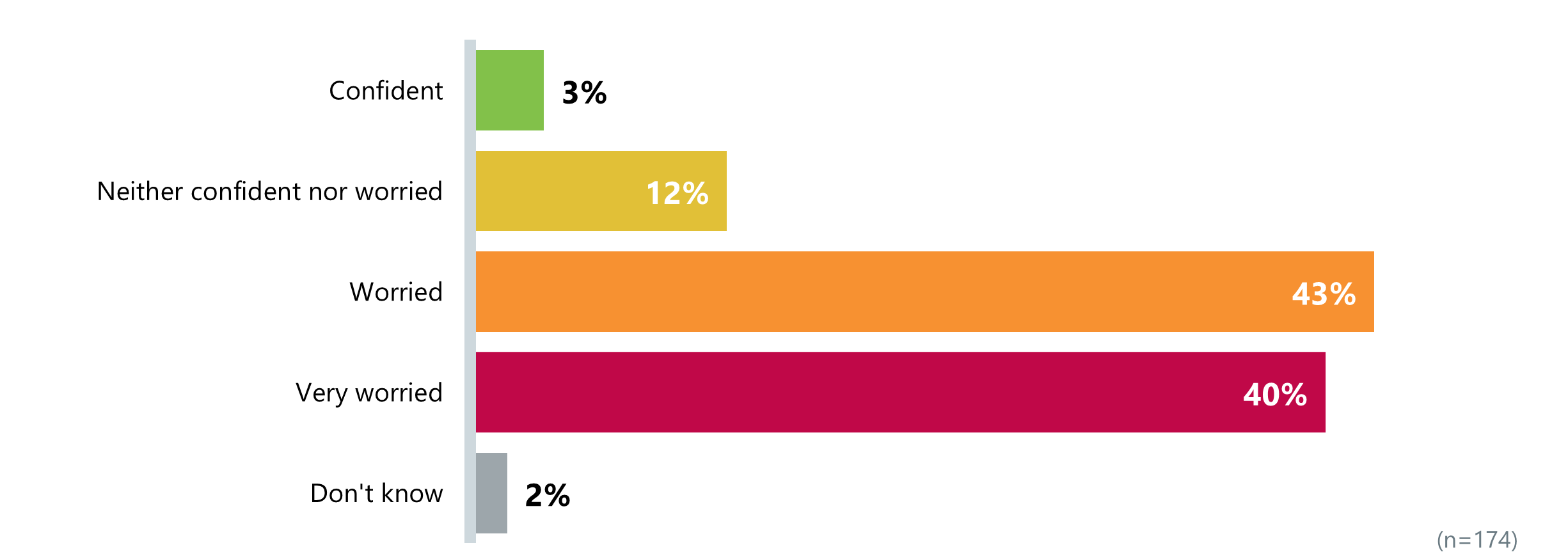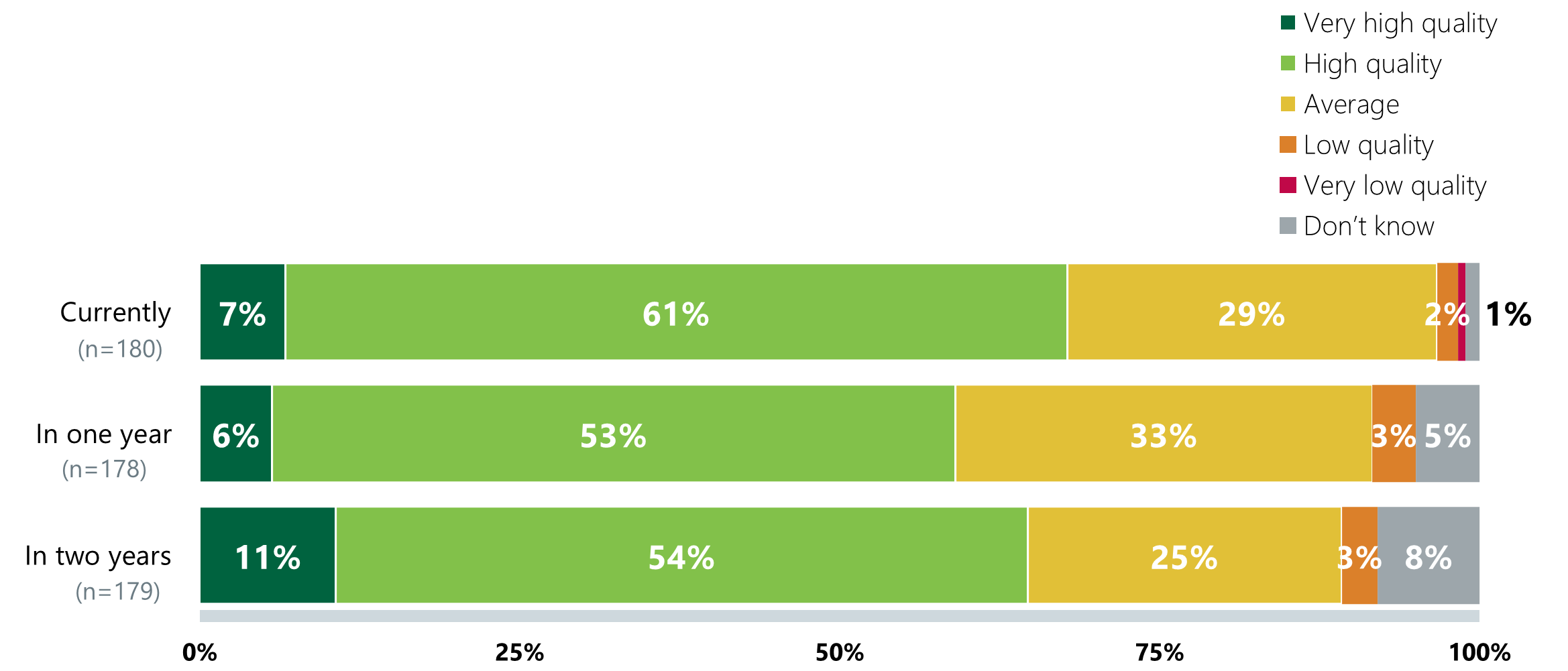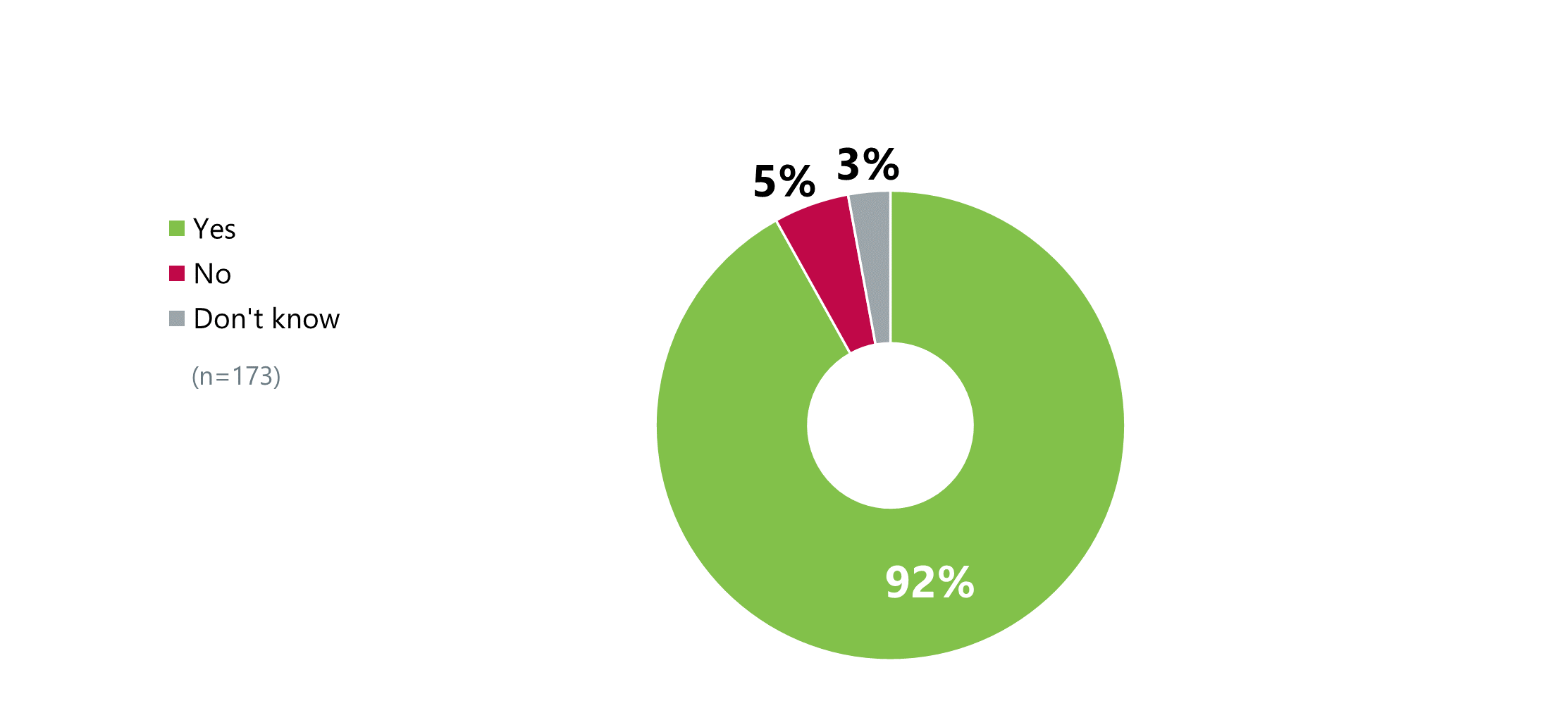How concerned are you about the current level of burnout across your workforce?
- 34% of trust leaders are extremely concerned about the current level of burnout across the workforce, with 48% moderately concerned, 17% slightly concerned and 1% not at all concerned.
- There was little variation by trust type in terms of those who were extremely concerned. Community trusts had the highest number of those slightly concerned (41%).

Quotes:
“Staff have been working in high stress circumstances for quite some time, long hours and not having leave. Despite wellbeing offers, this is a real concern” – director of nursing, mental health/ learning disability trust
“Some staff I talk to are energised, recommitted to their vocation and have been given a new lease of life by their recent experiences. Others are exhausted. It is hard to know what proportion are in each group.” – chief executive, acute trust
“Staff burnout is a very clear strategic risk for us - moving from a busy winter in 19/20, into pandemic, phase 3 recovery and back into a busier winter with the potential of extremely busy 20/21 with potential for further spikes and Brexit.” – chief executive, acute trust
How concerned are you about the impact of seasonal pressures over winter on your trust and local area?
- 94% of trust leaders are extremely (56%) or moderately (38%) concerned about the impact of seasonal pressures over winter on their trust and local area.
- Acute trusts (64%) and ambulance trusts (63%) were most likely to say they are extremely concerned about the impact of seasonal pressures over winter. This compares to 33% of combined mental health and learning disability and community trusts and 47% of mental health and learning disability trusts.
- When looking at combined scores of extreme and moderate levels of concern there was no significant variation by region.

Quotes:
"We have a perfect storm on the horizon; depleted staff, depleted capacity, increasing workload.” – chief executive, acute trust
"This year it is possible that we will be affected by a no-deal Brexit leading to severe difficulties, winter pressures and a further wave of Covid-19 at the same time. We are planning for that but there is a limit to what can really be achieved in the time and financial window.” -chief executive, ambulance trust
"We are seeking to learn the lessons of the spring and ensure that we capture the best of that, learn any lessons in terms of who was not well served by these changes, build as best we can resilience in our voluntary sector partners, bring in other asset holders such as housing providers and work even more closely with employment advice services.” – chair, mental health and learning disability trust
How confident are you that plans and activities from the national NHS leadership (the Department of Health and Social Care and its arms-length bodies, including NHS England and NHS Improvement and its regional teams) are effectively supporting the delivery of a sustainable service in your area?
- 56% of trust leaders say that they are worried or very worried that plans and activities from the national NHS leadership are not effectively supporting the delivery of a sustainable service. Only 11% of trust leaders are confident in the activities from the national leadership and 31% are neither confident nor worried.
- Combined acute and community trusts were most likely to be worried or very worried about the plans and activities from national NHS leadership with 71% selecting these options. 58% of acute trust leaders shared the same opinion, as do 50% of ambulance trusts and combined mental health, learning disability and community trusts. Acute specialist trusts were slightly more positive with 38% saying they are worried or very worried.
- There was also significant variation by region. Those in the East of England (75%), the North East and Yorkshire (70%) and the South East (64%) were most likely to be worried or very worried. This compares to 26% in the North West, 47% in London and 57% in the South West.

Quotes:
"As a community services provider I feel that the priority at national and regional level continues to be on acute services when strategy revolves around supporting more care at home but with little if any shift of resource or investment” – chief operating officer, community trust
"NHS England and NHS Improvement seem to be focused on the right things but the constant requests for short-turnaround returns is very frustrating.” – director of strategy, combined acute and community trust
"The centralisation of decision taking leads to delays and detachment from the frontline” – chair, combined acute and community trust
How confident are you that sufficient investment is being made in social care in your local area? (This could include direct investment by the trust, by the system and its partners)
- 83% of trust leaders are worried or very worried that insufficient investment is being made in social care in their local area.
- There was some variation by trust type. Similar to the trend for public health, 94% of respondents from mental health and learning disability trusts are worried about the investment being made in social care in their local area. Those from ambulance trusts were slightly less worried with 71% saying they were worried or very worried. Other trust types fell within this range.
- There was no significant variation by region.

Quotes:
"The pandemic has highlighted that many of the traditional barriers to social care have been because of money. When that barrier was taken away temporarily, we were able to do so much more” - company secretary, acute trust
"Community services cannot function properly to facilitate discharge and avoid admission without social care support - they are willing but don't have enough money” – medical director, combined mental health / learning disability and community trust
"[There are] clear gaps in provision, especially for supported accommodation” – chief operating officer, mental health/ learning disability trust
How would you rate the quality of healthcare provided by your local area now and in the future?
- 68% of trust leaders say that the healthcare currently being provided in their local area is of a high or very high quality, 29% said average quality and 3% said low or very low quality.
- Trust leaders rated this over one and two years. Trust leaders expect the quality to fall over the next year but improve slightly in year two. However, they predict that the quality in two years will be lower than current levels.
- There was only small variation across trust type when it came to rating the quality of healthcare in their local area. Acute and mental health trusts were slightly more positive than combined trusts.

Quotes:
"Finance is uncertain. Recruitment will be affected by Brexit. There were some lengthy waiting times before covid-19 and some of these have substantially deteriorated.” – chair, community trust
"A major challenge at the moment is restoring services and dealing with backlogs within the estates constraints that we face. If we avoid bad winter pressures and a major resurgence of COVID-19 the answer to the question is ‘confident.”- chair, community trust
"Our forecasting work is giving some big numbers and it’s not just these 12 months but over a five-year period - this is a sustained increase in demand across all mental health services. So, this is not going to go away.” – mental health/ learning disability trust
"We will need a different financial block settlement if we are to recruit enough staff to be confident” – chief executive, ambulance trust
Do you think that the pandemic has accelerated better partnership working/collaboration in local systems?
- 92% of trust leaders say that the pandemic accelerated better partnership working and collaboration in local systems.
- There was no significant variation by trust type or region.

Quotes
"Partnership working was broadly developing well at a system level, COVID has accelerated the need for teams to work collectively and has seen wider ownership of partnership and system working” – finance director, mental health/ learning disability trust
"Partnership working at integrated care system (ICS) level was already fairly good, but I am concerned about the expectations that NHS England and NHS Improvement seem to have of the ability of ICSs to lead in a really challenging environment. The present ambiguity about their roles in that they are attempting to promote system working but also to performance manage at place level is unhelpful.”- medical director, combined acute and community trust
"Local place- level has seen accelerated collaboration but the progress at ICS level is limited.” – chair, combined acute and community trust
"Some fantastic initiatives developed and implemented at pace. Blurring of organisational boundaries, a focus on a single aim by all partners, the 'easier' financial regime and more flexible governance by all statutory organisations have been important in this.” – chair, acute trust